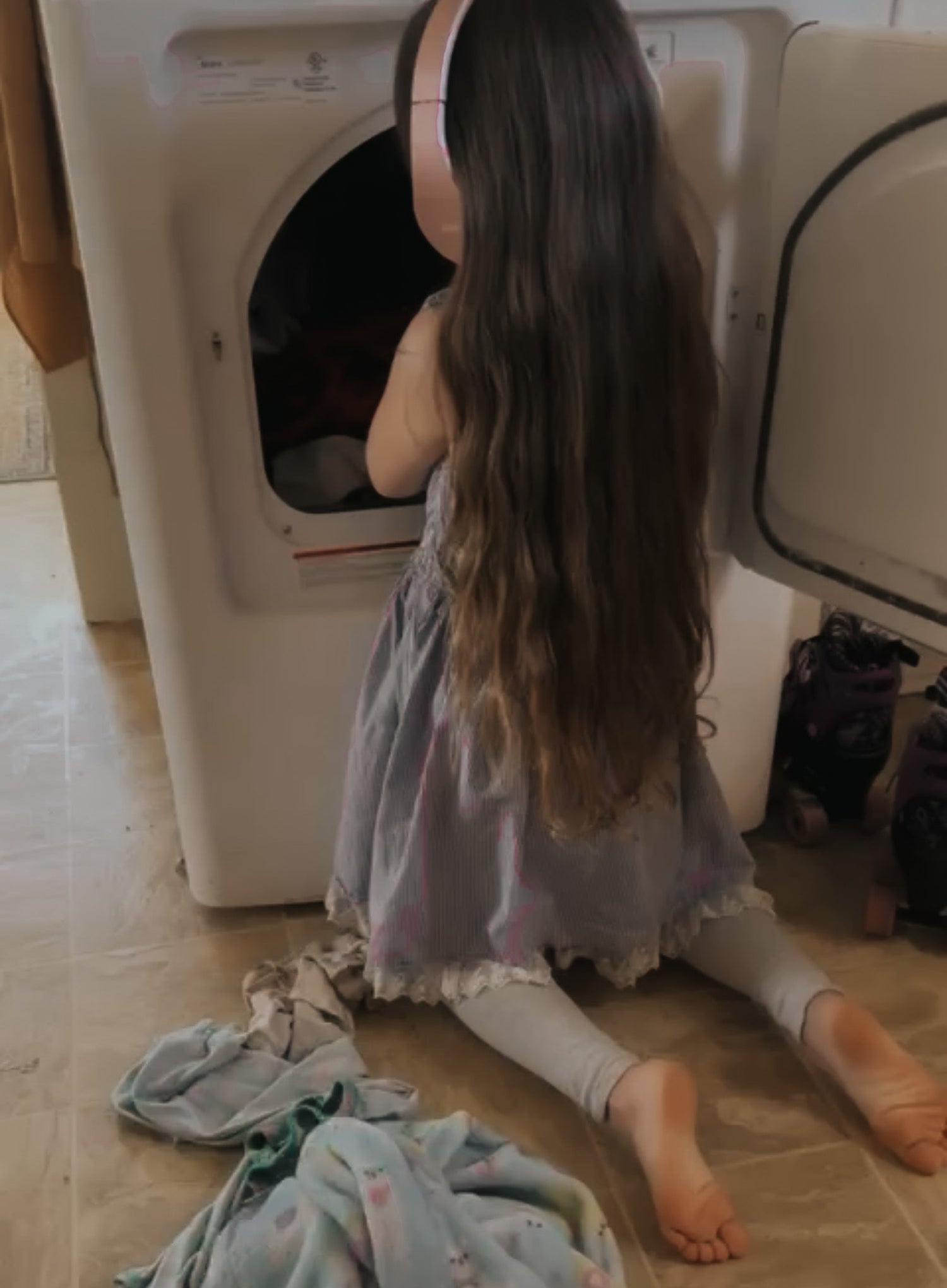
Kids' Morning List & Chore System
Studies are showing that children who are given responsibilities at a young age are happier and more successful in life- a true reflection of their God-given calling to bring order from chaos, and to stewardship! This blog post discusses the particulars of how we (McCauley and I, Shelby) involve our children in keeping the home.
The cover image for this blog post is my daughter unloading the dryer at 18 months- the first chore besides cleaning up toys that I like to assign! I'm so thankful I involved my children as toddlers- they have so many skills now, at 5 and 8, and are such a huge help while we expand our family businesses.
They even have ways to earn significant money beyond their daily chores, which is very motivating for them to keep maturing and gaining skills. And while cheerful diligence is a habit that everyone has to work on, at the end of the day, they really do LOVE being involved and are constantly coming up with ways to be more helpful on their own!
Differences in Approach
I keep my kids’ chores as part of their Morning List, and I only update it every 3-6 months, usually just based on when I see the kids maturing and ready for the next level. Having one set of chores per kid for such a long time makes it feel really simple for me to train them in excellence. I also focus on delegating chores that truly help me out, and would’ve otherwise been easily neglected (i.e. taking out the bathroom trash—I was always overlooking that until I was cleaning the bathroom after taking a shower in the evening, which is my habit, and I’d have to take it out in my pajamas before I could settle in with a cup of tea 👎).
McCauley likes to make “do chores” an item on the Morning List, and then her kids go to their rotating Chore Chart to find out what they need to do that day. This is what we did growing up, and it helped things stay interesting, and gave Mama plenty of opportunities throughout the week to train us in a large variety of skills.
Mama had added to this rotation the assignment of a parents’ “helper.” This made it simple to know which kid would be taken on an errand, help with dinner, clean up sticks before mowing, etc., It really settled a lot of arguments before they even began! She still does this with my youngest siblings.
I think each family has to experiment and tweak things until they work for them!
Tips:
-
Try anchoring your Morning List to be done BEFORE something else that is already established and going to happen in your day (for us, it’s Morning Basket!) — Write it clearly on the list so your child knows the expectations. (The last item on my kids’ list, which is academic, is accomplished right after Morning Basket, and they know this.) Chores do not have to take all day.
-
Don’t be too aggressive or idealistic! These are powerful tools, and can honestly automate so much in your life. However, if your kids aren’t used to doing chores every day as a habit, you want to first get them used to the habit and then start implementing more challenging chores that take extra training. Show kids what they need to do, calmly, methodically, cheerfully, and with your hands more than with your mouth. They’re quick studies, but often need practice to get it just right.
-
Choose precision over delegating huge tasks. It’s okay to expect your kids to do it just right—just make sure that it’s physically and emotionally possible for your aged child to be able to do that chore just right. Don’t frustrate them with more than they can reasonably handle. Make sure they can actually complete what you’re asking of them, and that they can enjoy that satisfaction and sense of independent contribution. For example, I can expect my 4yo to take out the bathroom trash perfectly (including not dropping trash, replacing the liner, and washing his hands), but I don’t expect him to emotionally be able to handle cleaning the entire bathroom. I can also expect him to unload the dishwasher, but I only ask for perfection and thoroughness in putting away dishes where he can reach, while I allow him to put the dishes that go where he cannot reach either on the counter or leave them in the dishwasher, depending on what’s going on in the kitchen. However, if he misses a dish he could’ve reached, I kindly call him back from whatever he’s doing to come spot that dish by himself and put it away.
-
However, kids can do way more than we give them credit for. On Instagram, I saw a video by @Doc_Amen, and he that people don’t suffer from low self-esteem because they weren’t praised enough—it’s because they don’t feel competent! He said that giving kids chores in a way that builds their confidence, independence, and sense of competence is such an important part of them growing up to have stronger mental health. I totally agree! Kids are incredible, and they have loads of free time. They can absolutely leverage all of their time and energy for the good of the family. And if they’re big enough to make a mess, they’re certainly big enough to clean it up. Don’t enable!
-
Use your tongue wisely!! I CRINGE every time I hear someone tell a kid, “Oh, you think doing the dishes is fun now, but just wait until you’re 9” or “You only want to do that because it’s the fun chore.” We’re crazy for telling kids things like that! Do not speak words like this over your kids… Encourage, honor, and leverage their excitement to learn new skills! Thank them often for being a part of your family’s team, and illustrate for them exactly how unloading the dishwasher or putting the towels away helps each member of the family, and makes everything easier. Also, don’t ridicule for what they miss, or yell when they get distracted. They need patient training, not constant hounding! Mind your words, open your mouth in wisdom (fewer words spoken from a calm heart and with thoughtful timing are much more EFFECTIVE), and keep the law of kindness on your tongue! Your words are either a tree of life or a fire that burns down your child’s noblest intentions, making them feel like they can never do anything right. CHOOSE LIFE! 🌱🌳
-
Adopt a system that works well for your temperament! Implementing a system like this has a lot more to do with a mother’s diligence and consistency than the child’s. They’ll fall in line with what they’re expected to do if you train them, if they truly feel a part of a team, and if they see their mama being diligent as well. So make the system something that feels simple for you to implement, and make sure you model cheerful diligence so they know what it looks like.
Related: "Involving children in household tasks: Is it worth the effort?" Research abstract by Marty Rossmann
Here’s the Canva template that McCauley and I share for creating chore lists for our kids. Clari uses a version of this for her kids, too! Check it out on Canva!
To use it, click the link above and then click the “Use Template for New Design” button (the grey one in the screenshot below!)
Once you’ve made a new design from this template, please feel free to delete pages and tweak your new design in any way you want! I left all of ours in there so you could see what Morning Lists look like for our kids' ages. (I added the ages of the kids in there, too, for reference!)




Leave a comment